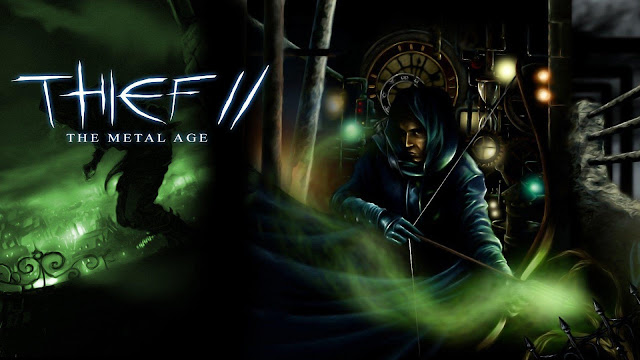Immersive Sims, the Best Genre - and Maybe the Smallest in Volume
The Vent Crawlers blog exists because we love immersive sims and want any excuse to talk about them. These are the games where you feel part of the world, where you have choice in how to engage with that world, and where your actions have weight and meaning. Referred to as variously 0451 games or vent crawlers (hence the blog name) or often bundled in with RPGs, usually typified by a first person viewpoint, a variety of toolsets or builds and a world lent realism through systems and physics, they intrinsically create unique moments, memorable experiences, and endless replay value. Whenever the old adage that every time someone mentions Deus Ex someone reinstalls in comes up on a YouTube video, you'll be able to find a comment from a person who never uninstalled it in the first place.
There is almost no chance that this piece would be anyone's primer, but just for the sake of it, this approach to game design has its roots in 1992's Ultima Underworld by Looking Glass Studios. The indie studio from Cambridge, Massachusetts wanted to create a 3D dungeon simulator where you could really move through the world, and eventually Warren Spector became general manager of Looking Glass Austin bringing the Ultima IP with him. Ultima Underworld received a sequel, and the company then made System Shock – a cyberpunk “space dungeon” simulator which removed NPCs to avoid the immersion-breaking effect of limited conversation abilities available to the player. Thief: The Dark Project, System Shock 2 and Thief 2: The Metal Age all followed before the studio's closure due to serious financial problems and potential publisher deals falling through.
Meanwhile Warren Spector had moved to ION Storm's Austin office in 1997, overseeing the team that was developing Deus Ex. They also found themselves with both the Thief IP and some of its core people like Terri Brosius, Eric Brosius, and for a time Randy Smith. Thief: Deadly Shadows would be ION Storm's final release before Spector left and Eidos closed the studio in 2004.
System Shock 2 and Thief alum Ken Levine found critical acclaim with BioShock in 2007, and eventually Arkane Studios arguably took the creative forefront in crafting immersive sims with their Dishonored series and 2017's Prey. Arkane also worked with and took consultation from many of the LGS and ION Storm veterans, with Deus Ex's Harvey Smith, Thief's Randy Smith and more involved. Stephen Russell, voice actor of Garrett in Thief, even came on board for a couple of games by Arkane, helping maintain the throughline.
In some ways immersive sims seem to have been made by a very small pool of studios and people – you certainly couldn't write a potted history of shooters or RPGs and hit all the key releases and many of the most senior personnel involved in a few short paragraphs. We find however that these games are so memorable and so replayable that it sometimes feels like there's so much more to discover (even though we really, really want more people to make high quality 0451 games).
There is almost no chance that this piece would be anyone's primer, but just for the sake of it, this approach to game design has its roots in 1992's Ultima Underworld by Looking Glass Studios. The indie studio from Cambridge, Massachusetts wanted to create a 3D dungeon simulator where you could really move through the world, and eventually Warren Spector became general manager of Looking Glass Austin bringing the Ultima IP with him. Ultima Underworld received a sequel, and the company then made System Shock – a cyberpunk “space dungeon” simulator which removed NPCs to avoid the immersion-breaking effect of limited conversation abilities available to the player. Thief: The Dark Project, System Shock 2 and Thief 2: The Metal Age all followed before the studio's closure due to serious financial problems and potential publisher deals falling through.
Meanwhile Warren Spector had moved to ION Storm's Austin office in 1997, overseeing the team that was developing Deus Ex. They also found themselves with both the Thief IP and some of its core people like Terri Brosius, Eric Brosius, and for a time Randy Smith. Thief: Deadly Shadows would be ION Storm's final release before Spector left and Eidos closed the studio in 2004.
System Shock 2 and Thief alum Ken Levine found critical acclaim with BioShock in 2007, and eventually Arkane Studios arguably took the creative forefront in crafting immersive sims with their Dishonored series and 2017's Prey. Arkane also worked with and took consultation from many of the LGS and ION Storm veterans, with Deus Ex's Harvey Smith, Thief's Randy Smith and more involved. Stephen Russell, voice actor of Garrett in Thief, even came on board for a couple of games by Arkane, helping maintain the throughline.
In some ways immersive sims seem to have been made by a very small pool of studios and people – you certainly couldn't write a potted history of shooters or RPGs and hit all the key releases and many of the most senior personnel involved in a few short paragraphs. We find however that these games are so memorable and so replayable that it sometimes feels like there's so much more to discover (even though we really, really want more people to make high quality 0451 games).




Comments
Post a Comment